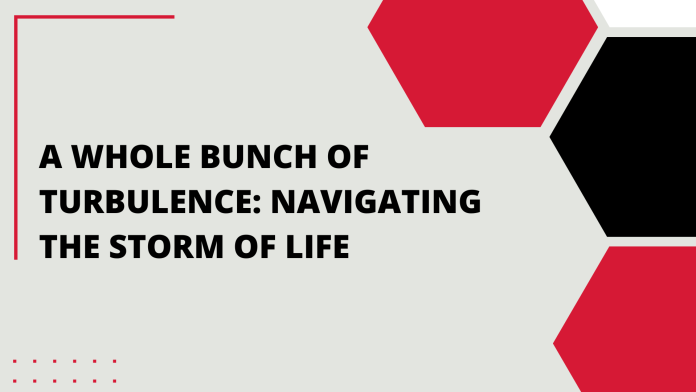Life is like a rollercoaster ride, filled with ups and downs, twists and turns. At times, it can feel like we’re navigating through a whole bunch of turbulence, leaving us disoriented and overwhelmed. But what is turbulence in the context of life, and how can we not only survive but thrive amidst it?
Understanding Turbulence
Turbulence in life refers to the periods of chaos, uncertainty, and instability that we all encounter. These can arise from external factors such as job loss, health issues, or relationship problems, or they can stem from internal struggles like anxiety or self-doubt. Understanding the nature of turbulence is the first step in effectively dealing with it.
The Impact of Turbulence
Turbulence can take a toll on our mental and emotional well-being. It can lead to stress, anxiety, and even depression if left unaddressed. It can strain relationships and hinder personal and professional growth. To navigate this storm, we need a set of strategies to weather the challenges.
Strategies for Managing Turbulence
Identifying the Sources
The first step in managing turbulence is identifying its sources. Is it external factors causing chaos in your life, or are your thoughts and emotions turbulent? By pinpointing the root causes, you can address them more effectively.
Finding Your Anchor
In the midst of turbulence, it’s essential to find your anchor—a source of stability and strength. This could be a supportive friend, a loving family member, or a personal passion that grounds you.
Developing Resilience
Resilience is the ability to bounce back from adversity. It’s a skill that can be cultivated through practices like mindfulness and self-compassion. Developing resilience can help you withstand life’s storms.
Turbulence in Relationships
Turbulence often surfaces in relationships. It may manifest as conflicts, misunderstandings, or even the end of a significant relationship. Learning effective communication and conflict resolution skills is crucial in such situations.
Turbulence at Work
Career-related turbulence can be challenging. It may involve job loss, a demanding boss, or a career change. By focusing on your skills and adaptability, you can navigate these challenges and even discover new opportunities.
Turbulence in Health
Health-related turbulence can be especially daunting. Coping with illness or injury can be emotionally draining. Seeking medical advice and support groups can help you manage your health while maintaining a positive outlook.
Coping Mechanisms
Mindfulness and Meditation
Mindfulness and meditation can provide solace during turbulent times. These practices promote self-awareness and help you stay centered, even when life feels chaotic.
Seeking Professional Help
There’s no shame in seeking professional help when facing overwhelming turbulence. Therapy can provide valuable insights and coping strategies to navigate life’s challenges.
Embracing Change
Change is inevitable, and often, turbulence accompanies it. Embracing change can be empowering, as it opens doors to new experiences and personal growth.
Facing Fear
Turbulence can breed fear and uncertainty. Confronting your fears head-on is a courageous step towards regaining control over your life.
Turbulence and Personal Growth
Interestingly, turbulence can be a catalyst for personal growth. It challenges us to adapt, learn, and become more resilient individuals.
Staying Positive
Maintaining a positive outlook, even in turbulent times, can make a significant difference in your overall well-being. Surround yourself with positivity and focus on gratitude.
Conclusion
Life’s turbulence is a natural part of the human experience. While it can be challenging, it is also an opportunity for growth, learning, and self-discovery. By identifying the sources, finding your anchor, and developing resilience, you can navigate the storm of life with grace and strength.
FAQs
What causes turbulence in life?
Turbulence in life can be caused by various factors, including external events such as job loss, health issues, or relationship problems, as well as internal struggles like anxiety and self-doubt.
Can turbulence be beneficial?
Yes, turbulence can be a catalyst for personal growth. It challenges individuals to adapt, learn, and become more resilient.
How do I handle turbulence in my career?
Handling career-related turbulence involves focusing on your skills, adaptability, and seeking new opportunities even in challenging circumstances.
Is seeking therapy a sign of weakness?
No, seeking therapy is not a sign of weakness. It is a brave step towards improving your mental and emotional well-being and gaining valuable coping strategies.
How can I embrace change in turbulent times?
Embracing change involves maintaining a positive outlook, confronting fears, and seeing change as an opportunity for personal growth and new experiences.

